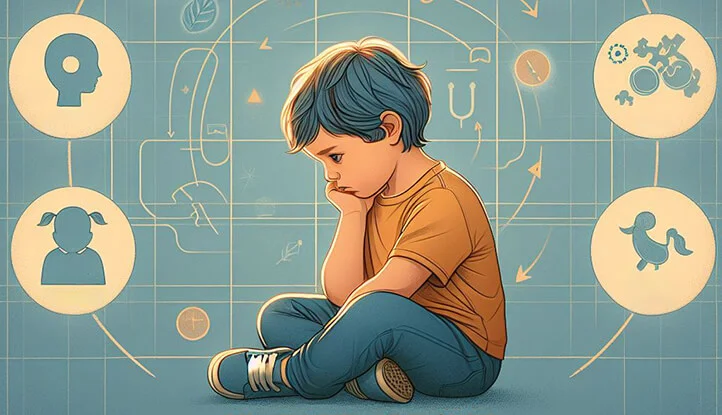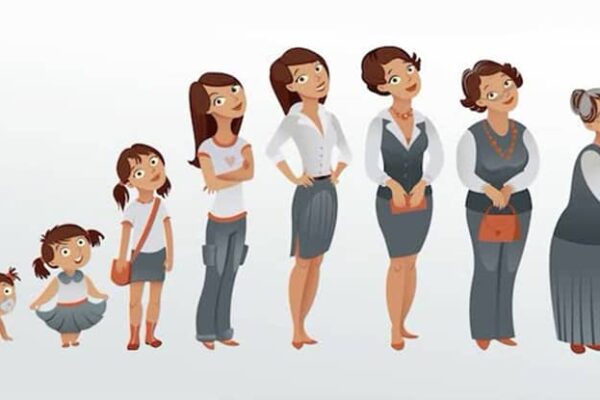Intellectual Developmental Delay (IDD) is a condition in which a child demonstrates a slower pace in developing certain mental functions and skills compared to normative benchmarks for their age. This can affect various areas such as speech, motor skills, cognitive abilities, social-emotional development, and adaptive behavior. It’s important to understand that developmental delay is not a diagnosis in itself but rather a symptom that can have various causes and levels of severity.
The prevalence of developmental delays varies depending on the diagnostic criteria and assessment methods used. Statistics indicate that approximately 1-3% of children under the age of five experience global developmental delays, while 5-10% show specific impairments in one or more areas of development.

Causes of Intellectual Developmental Delay
Intellectual developmental delay can have many different causes affecting the normal course of a child’s development before birth, during pregnancy, childbirth, or early childhood. Understanding these causes is crucial for the timely identification of risk factors, making an accurate diagnosis, and developing the most effective correctional assistance program.
The causes of intellectual developmental delay can be broadly divided into several key groups: genetic and biological factors, pregnancy and childbirth complications, illnesses and injuries in early childhood, and unfavorable environmental conditions. Often, a combination of several risk factors exacerbates developmental delays. Let’s take a closer look at each group of causes.
Genetic Factors
- Chromosomal abnormalities: Down syndrome, Edwards syndrome, Patau syndrome, and other chromosomal disorders are often associated with intellectual developmental delays of varying severity.
- Hereditary diseases: Certain genetic disorders such as phenylketonuria, Tay-Sachs disease, and fragile X syndrome can affect brain and nervous system development, leading to developmental delays.
- Congenital metabolic disorders: Metabolic disorders like galactosemia, homocystinuria, and others can negatively impact a child’s development.
Problems During Pregnancy and Childbirth
- Premature birth: The earlier a child is born, the higher the risk of developmental delay, especially if born before 32 weeks of pregnancy.
- Infections during pregnancy: Certain infections like toxoplasmosis, rubella, cytomegalovirus, and herpes can harm the developing fetus, leading to developmental delays.
- Birth complications: Asphyxia (lack of oxygen), head injuries during childbirth, and brain hemorrhages can negatively affect a child’s development.
- Exposure to toxins or medications: Alcohol, drugs, or certain medications during pregnancy can disrupt the normal development of the fetus.
Illnesses in Early Childhood
- Brain injuries: Traumatic brain injuries, especially severe ones, can lead to developmental impairments.
- Infections of the central nervous system: Meningitis, encephalitis, and certain viral diseases (such as measles, chickenpox) can damage the developing brain.
- Seizure disorders: Epilepsy and other seizure disorders, if not properly controlled, can negatively affect a child’s development.
- Severe somatic diseases: Chronic illnesses such as heart, kidney, or oncological diseases can lead to intellectual developmental delay due to the overall depletion of the body.
Unfavorable Environmental Conditions
- Inadequate nutrition: A deficiency of essential nutrients, particularly proteins, vitamins, and minerals, can negatively impact brain development and a child’s overall growth.
- Lack of stimulation and enriched environment: Insufficient toys, books, communication, and other developmental stimuli can result in intellectual developmental delays.
- Emotional deprivation and neglect: Lack of emotional closeness, care, and attention from adults negatively affects a child’s development in all areas.
- Toxic exposure: Exposure to lead, mercury, pesticides, and other toxic substances can disrupt normal nervous system development.
- Psychosocial stress: Prolonged stress related to poverty, family conflict, violence, or other adverse conditions can negatively affect a child’s intellectual development.
It is important to note that intellectual developmental delay is often the result of a combination of several risk factors rather than a single cause.

Types of Intellectual Developmental Delay
Intellectual developmental delay can manifest in various forms and affect different areas of a child’s development. Some children may experience global developmental delay, where multiple areas such as speech, motor skills, cognitive abilities, and socialization are delayed simultaneously. Others may have a more specific delay, affecting only certain areas of development. Understanding the different types of delay is essential for accurate diagnosis and developing an effective correctional assistance program.
Speech Delay
- Late onset of first words and phrases: The child begins speaking much later than most of their peers.
- Limited vocabulary: The child’s vocabulary is significantly smaller than that of children the same age.
- Difficulties with pronunciation and articulation: The child struggles with clear pronunciation of individual sounds or entire words.
- Speech structure issues: The child builds sentences incorrectly, mixes up grammatical cases, verb tenses, and does not use prepositions or conjunctions.
- Problems understanding speech: The child poorly understands spoken language, especially complex instructions and abstract concepts.
Motor Delay
- Delayed development of gross motor skills: The child learns to hold their head, sit, crawl, walk, and run later than their peers.
- Delayed development of fine motor skills: Difficulties with grasping and holding objects, manipulating small toys, drawing, and fastening buttons.
- Problems with coordination of movements: The child often trips, spills drinks, poorly catches and throws a ball, and has an impaired gait.
- Insufficient development of motor planning: The child struggles with performing sequences of movements and mastering new motor skills.
Cognitive Delay
- Slowed intellectual development: The child demonstrates lower IQ scores and overall intellectual development compared to the norm for their age.
- Difficulties with learning and assimilating new information: The child finds it difficult to remember and apply new knowledge, quickly forgetting recently learned material.
- Problems with attention and memory: The child is easily distracted, cannot concentrate on one activity for long, and has poor memory for instructions and events.
- Delay in developing logical thinking and problem-solving skills: The child finds it hard to establish cause-and-effect relationships, make conclusions, and find non-standard solutions.
- Difficulties with abstraction and generalization: The child poorly understands abstract concepts and metaphors and struggles to transfer knowledge from one situation to another.
Social-Emotional Delay
- Difficulties with forming and maintaining social relationships: The child finds it hard to make friends and understand social norms and group behavior rules.
- Delayed emotional regulation and self-control: The child frequently experiences outbursts of anger, crying, or other strong emotions and cannot control them.
- Problems understanding social norms and rules: The child violates personal boundaries, does not understand what is appropriate in public places and what is not.
- Delay in the development of play activities and imagination: The child struggles with role-playing games, preferring simple manipulations with toys without developing a storyline.
- Difficulties recognizing and expressing emotions: The child poorly recognizes other people’s emotions through facial expressions, gestures, tone of voice, and cannot clearly express their own feelings.
It is important to note that intellectual developmental delay can affect one or more areas and vary in severity from mild to severe.

Diagnosing Intellectual Developmental Delay
Diagnosing intellectual developmental delay is a complex and multi-stage process that requires the involvement of a team of specialists from different fields. Timely and accurate identification of the causes, nature, and severity of the delay is crucial for planning a child’s further correctional assistance and support program.
In the early stages, parents’ and teachers’ observations of a child’s development, as well as screening tests, play an important role. However, to make a final diagnosis, a comprehensive assessment involving pediatricians, psychologists, speech therapists, neurologists, and other specialists is required. Each stage of the diagnostic process is essential and helps gather maximum data for an objective evaluation.
Observation of the Child’s Development
- Parents and teachers monitor the achievement of key developmental milestones such as the appearance of first words, the ability to sit, walk, and interact with others.
- They notice any delay in acquiring new skills compared to peers or a sharp slowdown in the pace of development.
- They record behavioral, communication, and learning issues that may indicate a delay in certain areas of development.
Screening Tests
- Standardized questionnaires and tests for quickly assessing key areas of development (speech, motor skills, socialization, cognitive abilities).
- Conducted by pediatricians, psychologists, or child development specialists during routine check-ups or upon parents’ request.
- Help determine the need for further comprehensive assessment in case developmental delays are detected.
Comprehensive Evaluation by Specialists
- A multidisciplinary team of specialists, including pediatricians, psychologists, speech therapists, special education teachers, neurologists, and other professionals.
- Various tests and observations are conducted to assess cognitive, speech, motor, social-emotional, and adaptive skills.
- An analysis of medical history, upbringing conditions, social environment, and other factors influencing the child’s development.
Based on the comprehensive evaluation, specialists can diagnose developmental delay, determine its causes and severity, and develop an individualized correctional program. It’s important to regularly reassess the child’s development to track progress and adjust the assistance program as needed.

Methods of Treatment and Correction
Mental developmental delay is a condition that requires active intervention and corrective work to maximize a child’s potential. Today, a wide range of modern methods of treatment and rehabilitation have proven effective in overcoming various types of developmental delays.
The most effective approach is considered to be a comprehensive, multidisciplinary approach, combining different techniques under the guidance of a team of specialists. The correction program should be highly individualized, taking into account each child’s unique needs, strengths, and limitations.
Early Intervention
- Comprehensive development stimulation program for children from birth to age 3, involving a multidisciplinary team of specialists.
- Includes training parents in the skills of stimulating the child’s development at home using games, sensory integration, massage, and other techniques.
- Encourages the maximum use of sensitive periods of brain development when it is most plastic and receptive to stimulation.
It has been proven that early intervention significantly improves developmental outcomes and helps prevent more serious delays in the future.
Speech Therapy
- Development of speech and communication skills under the guidance of a qualified speech therapist.
- Articulation exercises, formation of correct pronunciation, work on breathing and voice.
- Work on understanding and constructing grammatically correct sentences, developing coherent speech.
- Use of alternative and augmentative communication (gestures, pictograms, communication boards) in cases of severe speech impairments.
Speech therapy is essential not only for speech delay but also for the development of communication skills in other types of delays.
Physical Therapy
- Exercises to strengthen muscles and develop balance, increase joint mobility, and flexibility.
- Use of special equipment and play techniques such as balls, swings, slides to motivate the child and develop motor skills through play.
- Teaching self-care skills (dressing, undressing, hygiene procedures) to increase the child’s independence.
- Improvement of motor skills and coordination under the guidance of a physical therapist or instructor.
Physical therapy is especially important for developmental delays in gross and fine motor skills, as well as coordination issues.
Behavioral Therapy
- Development of social skills and emotional regulation under the guidance of a psychologist or behavior therapist.
- Use of behavior modification techniques such as positive reinforcement, token systems, modeling.
- Development of skills for recognizing and expressing emotions, understanding social cues, and following rules of behavior.
- Training parents in behavior management strategies for the home environment to reinforce acquired skills.
Behavioral therapy is crucial for delays in social-emotional development, behavioral issues, and adaptation problems.
Cognitive Therapy
- Development of thinking, memory, attention, and other cognitive functions under the guidance of a neuropsychologist or special education teacher.
- Use of special exercises, games, and computer programs to train cognitive skills.
- Teaching memory strategies and methods for structuring information to facilitate learning.
Cognitive therapy is especially important for intellectual developmental delays, learning difficulties, and attention deficits.
Medication Treatment
- Prescribed only in the presence of accompanying neurological or psychiatric disorders such as epilepsy, ADHD, or autism spectrum disorder.
- May include anticonvulsants, stimulants, antidepressants, and other medications depending on the diagnosis.
- Must be conducted under strict supervision by a specialist (neurologist, psychiatrist), with regular evaluation of effectiveness and side effects.
- It is not the primary method of treatment for mental developmental delay but only supplements the comprehensive correction program when necessary.
The most effective approach is a comprehensive multidisciplinary approach, combining various methods based on the child’s individual needs. The assistance program must be flexible and regularly reviewed as the child develops.

The Role of Family and Environment
The family and a favorable environment play a key role in the development of a child with mental developmental delay. Parents and close family members are the main participants in the correction process, creating conditions for implementing the support program and reinforcing acquired skills in everyday life. An atmosphere of love, acceptance, and support from the family is crucial for the child’s harmonious development.
The role of the environment is equally important, as it should be enriched with stimuli for cognitive, social, emotional, and physical development. Creating a safe, inspiring, and inclusive space maximizes the potential of correctional programs.
Creating Favorable Conditions for Development
- Enriched play and learning environments with various stimuli for sensory integration, cognitive, and social development.
- Providing opportunities for play, creativity, and discovery, encouraging exploratory behavior and curiosity.
- Use of adapted teaching methods and therapy at home under specialist guidance.
- Involving the child in daily household tasks to promote self-care skills and socialization.
Acceptance and Support of the Child
- Unconditional love, patience, and emotional support are essential for the child’s harmonious development.
- Positive reinforcement of even the smallest successes and achievements, focusing on strengths rather than weaknesses.
- Creating a safe and trusting atmosphere where the child is not afraid to experience new things or make mistakes.
- Involving the child in family life, social events, and leisure activities.
Collaboration with Specialists
- Regular consultations and meetings with the multidisciplinary team of specialists (pediatricians, psychologists, speech therapists, physical therapists, etc.) to assess progress and adjust the assistance program.
- Following specialists’ recommendations for home activities and exercises, creating a daily routine tailored to the child’s needs.
- Participation in educational programs and parent training on topics related to raising, developing, and supporting children with special needs.
- Building connections with other families who have children with mental developmental delays for sharing experiences and mutual support.

Prognosis and Future Development
The prognosis for future development of a child with mental developmental delay depends on many factors, including the causes of the delay, the severity of the condition, the timeliness of diagnosis and intervention, as well as the quality and continuity of support provided. Accurate prognosis assessment is essential in determining the most appropriate intervention and support strategies.
Mental developmental delay does not necessarily mean that the child is doomed to stagnation and an inability to grow. With the right approach, combining the efforts of specialists and the child’s close environment, many children can overcome their challenges and make significant developmental progress.
Continuous support at all stages of life—from early childhood to adult independence—plays a vital role in this process. Ongoing assistance and the creation of a supportive, inclusive environment allow a person with special needs to fully realize their potential.
Overcoming Developmental Delays
- In cases of mild developmental delays, many children can catch up with their peers and overcome their delays with timely help and support.
- The most favorable prognosis is observed in cases where the delay is caused by temporary environmental factors (e.g., emotional deprivation) that are subsequently eliminated.
- Children with moderate to severe developmental delays may need additional support throughout life to achieve the highest possible level of independence.
Continuity of Support
- Continuous, coordinated support at all stages of the child’s development—from early childhood to adolescence—is crucial for achieving the best results.
- Ensuring a smooth transition from one intervention program to another as the child grows and their needs change.
- Continuity of work between specialists of different profiles (psychologists, speech therapists, special education teachers, etc.) helps avoid gaps in corrective work.
- Coordination between specialists and parents to reinforce skills in various environments.
Social Adaptation and Integration
- Many children with developmental delays, with appropriate support, can successfully integrate into society and lead independent lives to the best of their abilities.
- Creating an inclusive environment in educational institutions, workplaces, and in social and cultural life is essential for their adaptation.
- Vocational guidance and employment programs help adolescents and young adults with developmental delays find suitable jobs.
- Involvement in leisure activities, creative projects, and volunteering contributes to socialization and self-fulfillment.
- Acceptance by society and tolerance towards disabilities and special needs are key factors in successful integration.
- Families, close people, and specialists play a vital role in accompanying and supporting a person with developmental delays throughout their life.

Conclusion
Mental developmental delay is a complex condition that requires a comprehensive approach and involvement of all interested parties to maximize the child’s potential. Early diagnosis, timely corrective measures, continuity of support, and the creation of a favorable environment are key factors for success.
It is important to remember that each child is unique, and their developmental pace is individual. Patience, love, and support from the family, combined with coordinated efforts from specialists, can help reveal the child’s abilities, despite the developmental delay.
Building an inclusive society free from prejudice and stigma towards people with special needs is one of the most important tasks. Acceptance of diversity, creating an accessible environment, and providing equal opportunities for everyone are what we must strive for.
Only by uniting the efforts of specialists, families, and the community can we ensure that children with mental developmental delays have the opportunity to fully realize their potential and live a full, dignified life.




